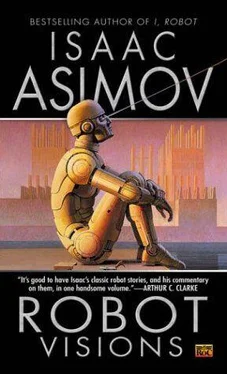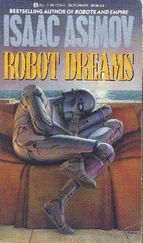Isaac Asimov - Robot Visions
Здесь есть возможность читать онлайн «Isaac Asimov - Robot Visions» весь текст электронной книги совершенно бесплатно (целиком полную версию без сокращений). В некоторых случаях можно слушать аудио, скачать через торрент в формате fb2 и присутствует краткое содержание. Жанр: Фантастика и фэнтези, на английском языке. Описание произведения, (предисловие) а так же отзывы посетителей доступны на портале библиотеки ЛибКат.
- Название:Robot Visions
- Автор:
- Жанр:
- Год:неизвестен
- ISBN:нет данных
- Рейтинг книги:5 / 5. Голосов: 1
-
Избранное:Добавить в избранное
- Отзывы:
-
Ваша оценка:
- 100
- 1
- 2
- 3
- 4
- 5
Robot Visions: краткое содержание, описание и аннотация
Предлагаем к чтению аннотацию, описание, краткое содержание или предисловие (зависит от того, что написал сам автор книги «Robot Visions»). Если вы не нашли необходимую информацию о книге — напишите в комментариях, мы постараемся отыскать её.
Robot Visions — читать онлайн бесплатно полную книгу (весь текст) целиком
Ниже представлен текст книги, разбитый по страницам. Система сохранения места последней прочитанной страницы, позволяет с удобством читать онлайн бесплатно книгу «Robot Visions», без необходимости каждый раз заново искать на чём Вы остановились. Поставьте закладку, и сможете в любой момент перейти на страницу, на которой закончили чтение.
Интервал:
Закладка:
Bogert drew back a corner of his mouth. “You mean destroy thirty thousand dollars per robot. I’m afraid U. S. Robots wouldn’t like that. We’d better make an effort first, Susan, before we destroy anything.”
“In that case,” she said, sharply, “I need facts. Exactly what advantage does Hyper Base derive from these modified robots? What factor made them desirable, general?”
Kallner ruffled his forehead and stroked it with an upward gesture of his hand. “We had trouble with our previous robots. Our men work with hard radiations a good deal, you see. It’s dangerous, of course, but reasonable precautions are taken. There have been only two accidents since we began and neither was fatal. However, it was impossible to explain that to an ordinary robot. The First Law states – I’ll quote it – ‘No robot may harm a human being, or through inaction, allow a human being to come to harm.’
“That’s primary, Dr. Calvin. When it was necessary for one of our men to expose himself for a short period to a moderate gamma field, one that would have no physiological effects, the nearest robot would dash in to drag him out. If the field were exceedingly weak, it would succeed, and work could not continue till all robots were cleared out. If the field were a trifle stronger, the robot would never reach the technician concerned, since its positronic brain would collapse under gamma radiations – and then we would be out one expensive and hard-to-replace robot.
“We tried arguing with them. Their point was that a human being in a gamma field was endangering his life and that it didn’t matter that he could remain there half an hour safely. Supposing, they would say, he forgot and remained an hour. They couldn’t take chances. We pointed out that they were risking their lives on a wild off-chance. But self-preservation is only the Third Law of Robotics – and the First Law of human safety came first. We gave them orders; we ordered them strictly and harshly to remain out of gamma fields at whatever cost. But obedience is only the Second Law of Robotics – and the First Law of human safety came first. Dr. Calvin, we either had to do without robots, or do something about the First Law – and we made our choice.”
“I can’t believe,” said Dr. Calvin, “that it was found possible to remove the First Law.”
“It wasn’t removed, it was modified,” explained Kallner. “Positronic brains were constructed that contained the positive aspect only of the Law, which in them reads: ‘No robot may harm a human being.’ That is all. They have no compulsion to prevent one coming to harm through an extraneous agency such as gamma rays. I state the matter correctly, Dr. Bogert?”
“Quite,” assented the mathematician.
“And that is the only difference of your robots from the ordinary NS2 model? The only difference? Peter?”
“The only difference, Susan.”
She rose and spoke with finality, “I intend sleeping now, and in about eight hours, I want to speak to whomever saw the robot last. And from now on, General Kallner, if I’m to take any responsibility at all for events, I want full and unquestioned control of this investigation.”
Susan Calvin, except for two hours of resentful lassitude, experienced nothing approaching sleep. She signaled at Bogert’s door at the local time of 0700 and found him also awake. He had apparently taken the trouble of transporting a dressing gown to Hyper Base with him, for he was sitting in it. He put his nail scissors down when Calvin entered.
He said softly, “I’ve been expecting you more or less. I suppose you feel sick about all this.”
“I do.”
“Well – I’m sorry. There was no way of preventing it. When the call came out from Hyper Base for us, I knew that something must have gone wrong with the modified Nestors. But what was there to do? I couldn’t break the matter to you on the trip here, as I would have liked to, because I had to be sure. The matter of the modification is top secret.”
The psychologist muttered, “I should have been told. U. S. Robots had no right to modify positronic brains this way without the approval of a psychologist.”
Bogert lifted his eyebrows and sighed. “Be reasonable, Susan. You couldn’t have influenced them. In this matter, the government was bound to have its way. They want the Hyperatomic Drive and the etheric physicists want robots that won’t interfere with them. They were going to get them even if it did mean twisting the First Law. We had to admit it was possible from a construction standpoint and they swore a mighty oath that they wanted only twelve, that they would be used only at Hyper Base, that they would be destroyed once the Drive was perfected, and that full precautions would be taken. And they insisted on secrecy – and that’s the situation.”
Dr. Calvin spoke through her teeth, “I would have resigned.”
“It wouldn’t have helped. The government was offering the company a fortune, and threatening it with antirobot legislation in case of a refusal. We were stuck then, and we’re badly stuck now. If this leaks out, it might hurt Kallner and the government, but it would hurt U. S. Robots a devil of a lot more.”
The psychologist stared at him. “Peter, don’t you realize what all this is about? Can’t you understand what the removal of the First Law means? It isn’t just a matter of secrecy.”
“I know what removal would mean. I’m not a child. It would mean complete instability, with no nonimaginary solutions to the positronic Field Equations.”
“Yes, mathematically. But can you translate that into crude psychological thought. All normal life, Peter, consciously or otherwise, resents domination. If the domination is by an inferior, or by a supposed inferior, the resentment becomes stronger. Physically, and, to an extent, mentally, a robot – any robot – is superior to human beings. What makes him slavish, then? Only the First Law! Why, without it, the first order you tried to give a robot would result in your death. Unstable? What do you think?”
“Susan,” said Bogert, with an air of sympathetic amusement. “I’ll admit that this Frankenstein Complex you’re exhibiting has a certain justification – hence the First Law in the first place. But the Law, I repeat and repeat, has not been removed – merely modified.”
“And what about the stability of the brain?”
The mathematician thrust out his lips, “Decreased, naturally. But it’s within the border of safety. The first Nestors were delivered to Hyper Base nine months ago, and nothing whatever has gone wrong till now, and even this involves merely fear of discovery and not danger to humans.”
“Very well, then. We’ll see what comes of the morning conference.”
Bogert saw her politely to the door and grimaced eloquently when she left. He saw no reason to change his perennial opinion of her as a sour and fidgety frustration.
Susan Calvin’s train of thought did not include Bogert in the least. She had dismissed him years ago as a smooth and pretentious sleekness.
Gerald Black had taken his degree in etheric physics the year before and, in common with his entire generation of physicists, found himself engaged in the problem of the Drive. He now made a proper addition to the general atmosphere of these meetings on Hyper Base. In his stained white smock, he was half rebellious and wholly uncertain. His stocky strength seemed striving for release and his fingers, as they twisted each other with nervous yanks, might have forced an iron bar out of true.
Major-general Kallner sat beside him; the two from U. S. Robots faced him.
Black said, “I’m told that I was the last to see Nestor 10 before he vanished. I take it you want to ask me about that.”
Dr. Calvin regarded him with interest, “You sound as if you were not sure, young man. Don’t you know whether you were the last to see him?”
Читать дальшеИнтервал:
Закладка:
Похожие книги на «Robot Visions»
Представляем Вашему вниманию похожие книги на «Robot Visions» списком для выбора. Мы отобрали схожую по названию и смыслу литературу в надежде предоставить читателям больше вариантов отыскать новые, интересные, ещё непрочитанные произведения.
Обсуждение, отзывы о книге «Robot Visions» и просто собственные мнения читателей. Оставьте ваши комментарии, напишите, что Вы думаете о произведении, его смысле или главных героях. Укажите что конкретно понравилось, а что нет, и почему Вы так считаете.








